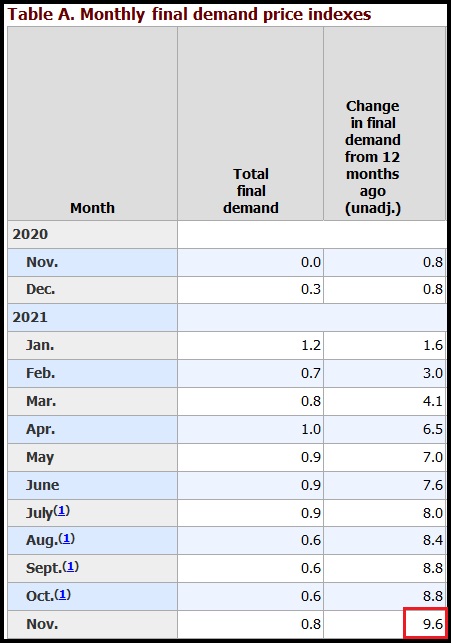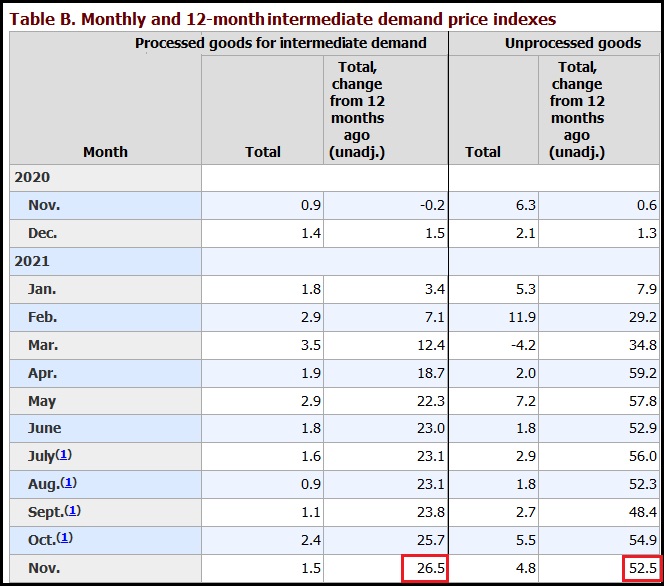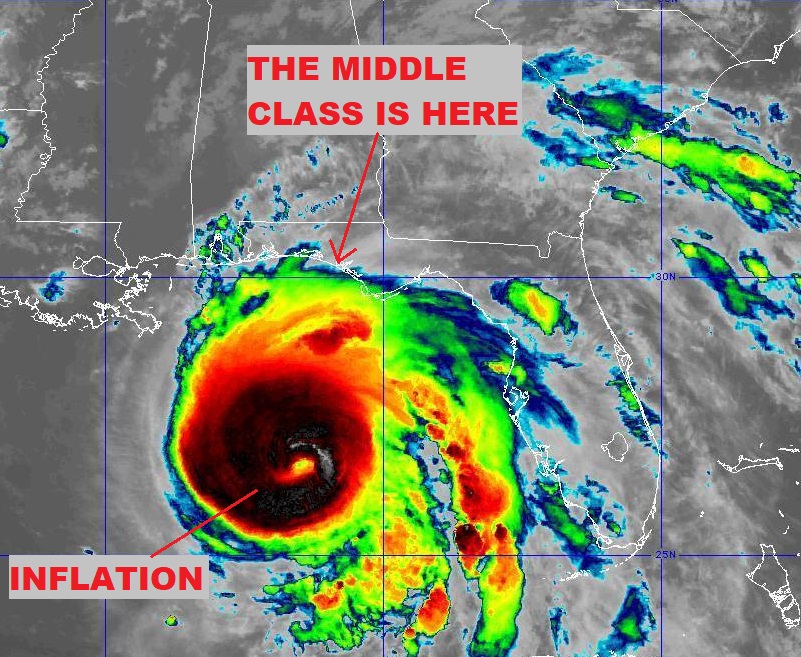We said it was happening {Go Deep}, and it is. Last month CTH put the preparation window at 60 days +/- depending on region. That window is now around 30 days before the next spike in inflation shows up from cumulative costs snowballing throughout the supply chain. The “producer price index” is essentially the tracking of wholesale prices at three stages: Origination (commodity), Intermediate and Final.
 The final product inflation rate in July (reported in August) was alarming at 7.8%. However, we warned it would get worse. The Bureau of Labor and Statistics (BLS) then released stunning price data for October [DATA Here], showing an even more dramatic 8.6% price increase in final demand. More intense warnings shared.
The final product inflation rate in July (reported in August) was alarming at 7.8%. However, we warned it would get worse. The Bureau of Labor and Statistics (BLS) then released stunning price data for October [DATA Here], showing an even more dramatic 8.6% price increase in final demand. More intense warnings shared.
Today, we get the November BLS Result [DATA Here], and unfortunately the results are showing what was expected. The cumulative costs of massive increases in energy prices are building into the supply at an astonishing rate. The November data shows a rate of wholesale final goods inflation at 9.6%, the largest single month comparative rate increase in history.
The bureau even went back and revised/increased the August price index from 7.8 to 8.4 percent, and revised/increased the October figure from 8.6 to 8.8 percent. The average monthly price increase is almost a full percent… every month. It looks like the BLS backward revisions are an attempt to smooth down the rate of increase.
(BLS) – “The Producer Price Index for final demand increased 0.8 percent in November, seasonally adjusted, the U.S. Bureau of Labor Statistics reported today. Final demand prices moved up 0.6 percent in each of the 3 prior months. (See table A.) On an unadjusted basis, the final demand index rose 9.6 percent for the 12 months ended in November, the largest advance since 12-month data were first calculated in November 2010.” (more)
I modified Table A (final demand product pricing), taking out some of the noise to make it a little easier to see the big picture of what is happening.
When you see the wholesale level of prices almost double the increase in consumer level inflation rate, you can predict that consumer prices will likely go even higher. Future finished goods, at a retail level, will carry the current wholesale price increase.
Stuff costs a lot now… and because the inbound stuff to make the finished goods is still climbing in price…. stuff is about to cost even more. You can see this in the inflation rate of intermediate goods which I have highlighted below.
You can see from Table A (above) that finished good prices are still climbing. That’s the higher price inflation you are feeling when you buy a product.
More alarming is to look at the “intermediate demand” products [Table B below] as they flow through the manufacturing system. Two types of products are at the intermediate wholesale level: Processed Goods, and Unprocessed goods.

I have again modified Table B (above) to remove the noise. Notice two key aspects:
(1) Prices for both types of products are still climbing in the manufacturing process. Compare August, Sept., Oct., and now November, noticing how the prices are still climbing. Some of that has to do with energy and fuel costs still climbing. The increasing price for gasoline is built into each part of the transportation process.
(2) Notice the scale of the increase in the prices from prior months. The trend line is not leveling off, instead it’s doing the opposite. The rate of inflationary climb (price increase), at the intermediate level of goods coming into the system, is getting even more steep. The stuff coming into the manufacturing process is not only costing more, it is costing much more than before.
The wholesale prices of products into the system that end up at the retail level are still through the roof. In a major way, this is being driven by massive increases in energy costs throughout the entire supply chain.
This is going to get even uglier. Even if wages jumped in price 5% overnight (single month), which would be a large increase in wages, those wage increases are nowhere near enough to deal with this level of price increase at a consumer level. A nickel more per dollar earned is futile against a loaf of bread costing $1 more, or gasoline at $4.00/gal.
Do what you can now to start preparing your weekly budget in ways you may not have thought about before. Shop sales, use coupons, look for discounts and products that can be reformulated into multiple meals or multiple uses. Shelf-stable food products that can be muti-purposed with proteins is a good start.
Consider purchasing the raw materials for cleaning products, and reformulate them yourself to avoid these massive increases in petroleum costs.
Remember, when inflation hits like this, you can NATURALLY expect an eventual demand side response. People will stop purchasing things, because those things are just too expensive. When that happens, the inflationary spike can/will start to level off as the demand slows and excess inventory builds, albeit with higher prices built into the unaffordable existing inventory.
Unfortunately this drop in demand, a contraction in the economy, is what’s known as a recession. That leads to layoffs and unemployment, which only exacerbates the problems and puts downward pressure on wages – while the prices remain high.
Joe Biden spending more to try and subsidize people through this inflationary economic cycle only makes things worse for the middle class. More spending results in more inflation, which requires more subsidy, which requires more spending, which creases more inflation.
Your goal is to prepare yourself and your family for that moment when the economy starts contracting – yet prices remain high. If you can avoid future expenses by taking action before the highest prices hit, you will be in a better position. Be proactive with your household maintenance, and think about things that normally hit your monthly budget unexpectedly.
Try to avoid any unexpected expenses your memory provides you, by doing what you can do now.
Act or be acted upon.
Protect your family. Even if, heck, especially if, your kids or grandkids cannot see what is coming. Prepare yourself to help them even if they don’t know, or won’t admit, they will need the help. Be wise in your counsel, but do not alarm. Do not distress yourself with dark imaginings. Fellowship is not only needed, it is critical.
It is empowering to be prepared for the storms of life, just as it is to be prepared in advance of storms from weather.


